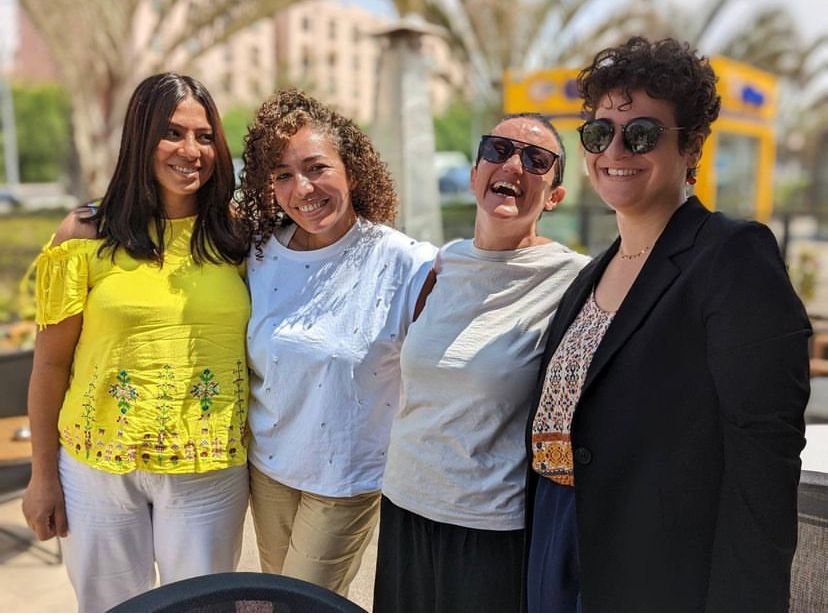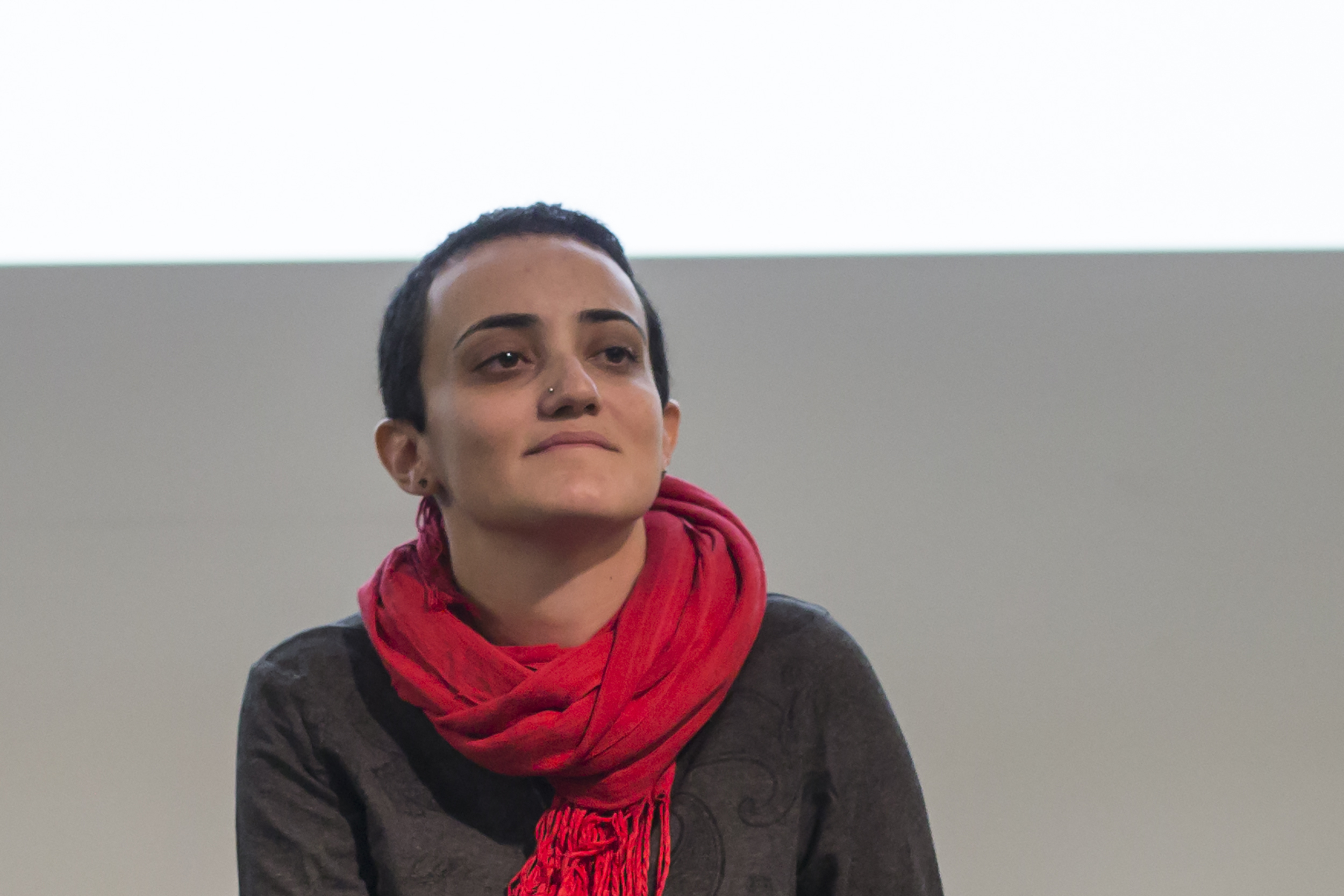On August 31, Mada Masr, one of Egypt’s last independent news sites, published an article about the potential reorganization of leadership in the Nation’s Future Party, which dominates parliament and supports Egyptian president Abdel Fattah el-Sisi. The article drew on comments from multiple sources “who are members of the party’s governing body and central secretariat,” and who told Mada Masr that the reorganization, allegedly planned to occur before parliament reconvenes next month, was related to “instances of corruption and abuse of power” by party leadership. Nation’s Future Party representatives denied the story and threatened legal action against the outlet.
Shortly after publication, an Egyptian court summoned four Mada Masr staffers—editor in chief Lina Attalah and reporters Rana Mamdouh, Sara Seif Eddin, and Beesan Kassab—for questioning. All were charged with criminal offenses, including “publishing false news,” before being released on bail; Attalah faces an additional charge, related to the licensing of Mada Masr, though she says she’s made licensing requests for years to no avail. Press-freedom and human rights organizations have decried the move by authorities and called for the charges to be dropped.
Attalah and fellow young journalists founded Mada Masr in 2013, after the site they had worked for, Egypt Independent, shuttered. They began by covering mass protests in 2013 and, in the years that followed, built Mada Masr’s reputation as a rare source of independent and critical media in the country—one of the few outlets to publish investigations into corruption, the military, and the political establishment. Since 2013, when a military coup ousted former president Mohamed Morsi, paving the way for Sisi’s presidency, Egypt has become one of the world’s worst jailers of journalists; currently, at least twenty-three journalists are in detention in the country, a majority for charges relating to “false news.” Mada Masr has faced regular state harassment. In 2017, access to the Mada Masr website from within the country was blocked; in 2019, security forces raided their offices after the site published an article about Sisi’s son; and, in 2020, Attalah was arrested outside of Tora prison while she was waiting to interview an imprisoned activist.
Attalah—a recipient of the International Center for Journalists’ Knight International Journalism Award for her work with Mada Masr—spoke with CJR about her team’s recent interrogation and their newsroom’s persistence. (Disclosure: The author previously worked at Mada Masr.) The conversation has been edited for length and clarity.

Attalah, second from right, with her colleagues. Photo courtesy of Mada Masr.
CJR: Walk me through the decision to publish the August 31 article about the Nation’s Future Party. Did you have any sense this story might bring about a backlash?
Attalah: The news piece was part of a daily bulletin that we publish in Arabic. Our choice was based on the fact that we follow issues of corruption very closely—it’s one of the main issues that we care about covering every day—and we had solid sourcing. This is typical of any story we do, sensitive or not; if you have what it takes to publish, in terms of verification and separate sourcing and all of that, then just go ahead and do it. You know?
We always wonder what kind of response a story could have. As you publish it, the question is always there. This is one of the stories that I thought would stir some response.
The court summons reached my mother’s place because that’s my official address. From the moment we saw that there have been complaints against us, we thought that there could be a summons and potentially a lawsuit. So I was kind of expecting it. Dreading it, but expecting it.
Can you describe your interrogation at the court, and where the case stands now?
Each one of us went in and saw the chief prosecutor for just a few minutes—a preliminary interrogation. He asked us some basic questions. In my case, I took responsibility for the article in my capacity as chief editor. After the initial questions, he sent the other journalists to other prosecutors, and each one of them had another interrogation, of an average of an hour. I had two of my lawyers with me, as well as representatives from the Egyptian Journalists Syndicate. That was the case also with all the other journalists, during the interrogations.
It was longer in my case, because I took responsibility for the pieces and because I had an additional accusation to deal with—running a website without a license. The judge respected my right not to name my sources, wrote everything I said quite accurately. So that bit of the process was good.
I cannot comment on the proceedings of this particular case, because it’s still underway, and we don’t know yet whether there will be an indictment or not. I was worried about whether I would be released at the end of the interrogations. But at the end of the day, I feel like I took my space and said everything that I needed to say. It was important on a level of appearance to make these points. To go into a prosecutor and say, We chose to publish this case because it’s a matter of public interest. Public personalities should be criticized. This is something that’s permissible by law.
I was asked to respond to a perception that I’m an enemy of the state. I said that journalism should be regarded as something that supports state investigative institutions that look into corruption cases, and that should never be considered the work of an enemy of the state.
The biggest issue that we’re facing, to be honest, is the licensing of our website. We figured during the interrogations that our license request was rejected, which puts us in major precarity. This is the battle that we will be having to fight in the coming days. It’s the priority. It’s a claim that is baseless. And we’ll see what’s going to happen.
What have your lawyers said about fighting the rejection of the license? Are they hopeful that something can be done?
I mean, I am hoping. All of us at Mada only have hope to hinge on. None of us is capable of conceiving that we might be closed on our tenth anniversary. We’ve just started to shape up, to have a position, to grow. We have a full newsroom, full of young people, so everybody wants all of this to continue. That’s the only hope I have. Everything else is completely blurry.
It was a very hectic day, you know. We had many threats that we might end up in jail. But by the following day, everybody was back on the desks, working energetically. Two days later, I had meetings with each one of them and planned for stories to be worked on. Today, I was editing a piece on green hydrogen, and it was a very complex edit. And towards the end—you know when an editor feels like they just cracked it? So I was so happy. And I was like, “Oh my God, I just wish nobody would take the joy of doing this job from me.”
How would you describe Mada Masr’s position in the Egypt media landscape at this point?
I think Mada remains quite marginal media—especially because we’ve been blocked since 2017. I would say that one of the main reasons why we have a bigger impact, relative to our size, is that there is not other media out there doing that kind of work. So this is where we stand—in the margin of the margin.
What are some of the ways you would like to see Mada grow?
The fact that we’ve been blocked, the fact that we don’t have resources, the fact that every time you try so hard to focus on our work we get derailed by lawsuits, raids, security, and dramas, and all of that…I just want it to live up to its potential. If we are given a bit of breathing space, I would like us to be even more pioneering. We are doing a lot of environmental coverage these days, and, as you know, Egypt is hosting COP27, the UN Climate Change Conference, in November. I just feel that there is such a poverty of Arabic-language journalism when it comes to ecological questions, and I feel like we’re making major contributions there. This is a project that wants to grow.
A lot of reporters in Egypt right now are detained under charges of false news. How has that affected the way people report?
It has tamed so many voices—because, as you say, it has become a very typical accusation against any oppositional voice. It’s mobilized against a host of people who are not just journalists. Just people posting on Facebook and social media, people who just express themselves and yet constantly get accused of spreading false news.
On a personal level, how do you balance running Mada, editing stories, and writing your own with all the legal threats?
I can’t make any big statements about how Mada takes over my life. I’m not a victim. I like it. I would like the time spent on creativity, knowledge-making, editing, and writing to supersede the time spent on legal battles. But I guess we’re shaped and formed by this crisis, as well. In the end, I still happen to be very lucky to be able to do this job when many others are lingering in prison right now. So I don’t need to talk about my personal life.
How do you decide when it’s worth it to publish the stories that might push up against the red lines?
If my sourcing is solid. That’s it.
Pesha Magid was a CJR fellow.

